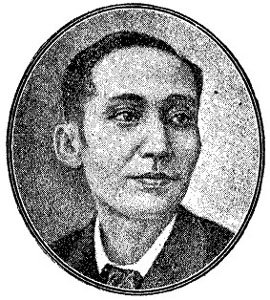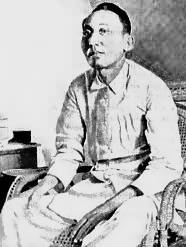<Back to Index>
- Political Philosopher and Prime Minister of the Philippines Apolinario Mabini y Maranan, 1864
- Painter Philipp Otto Runge, 1777
- Emperor of Ethiopia Haile Selassie I, 1892


Apolinario Mabini y Maranan (July 23, 1864 — May 13, 1903) was a Filipino political philosopher and revolutionary who wrote the constitution for the first Philippine Republic of 1899-1901, and served as its first prime minister in 1899. In Philippine history texts, he is often referred to as "the Sublime Paralytic", and as "the Brains of the Revolution." To his enemies and detractors, he is referred to as the "Dark Chamber of the President."
Mabini was born on July 23, 1864 in Barangay Talaga in Tanauan, Batangas. He was the second of eight children of Dionisia Maranan, a vendor in the Tanauan market, and Inocencio Mabini, an unlettered peasant. Mabini began informal studies under his maternal grandfather, who was the village teacher. Because he demonstrated uncommon intelligence, he was transferred to a regular school owned by Simplicio Avelino, where he worked as a houseboy, and also took odd jobs from a local tailor - all in exchange for free board and lodging. He later transferred to a school conducted by the Fray Valerio Malabanan, whose fame as an educator merited a mention in José Rizal's novel El Filibusterismo.
In 1881 Mabini received a scholarship to go to the Colegio de San Juan de Letran in Manila.
An anecdote about his stay there says that a professor there decided to
pick on him because his shabby clothing clearly showed he was poor.
Mabini amazed the professor by answering a series of very difficult
questions with ease. His studies at Letran was periodically interrupted
by a chronic lack of funds, and he earned money for his board and
lodging by teaching children. Mabini's
mother had wanted him to take up the priesthood, but his desire to
defend the poor made him decide to take up Law instead. A year after receiving his Bachilles en Artes with highest honors and the title Professor of Latin from Letran, he moved on to the University of Santo Tomas, where he received his law degree in 1894. Believing
that the Reform Movement still had a chance to achieve success, Mabini
did not immediately support the revolution of 1896. When José
Rizal was executed in December that year, however, he changed his mind
and gave the revolution his wholehearted support. In 1898, while vacationing in Los Baños, Laguna, Emilio Aguinaldo sent
for him. It took hundreds of men taking turns carrying his hammock to
portage Mabini to Kawit. Aguinaldo, upon seeing Mabini's physical
condition, must have entertained second thoughts in calling for his
help. Mabini was most active in the revolution in 1898,
when he served as the chief adviser for General Aguinaldo. He drafted
decrees and crafted the first ever constitution in Asia for the First
Philippine Republic, including the framework of the revolutionary
government which was implemented in Malolos in 1899. Apolinario Mabini was appointed prime minister and was also foreign minister of the newly independent dictatorial government of Emilio Aguinaldo on
January 2, 1899. Eventually, the government declared the first
Philippine republic in appropriate ceremonies on January 23, 1899.
Mabini then led the first cabinet of the republic. Mabini
found himself in the center of the most critical period in the new
country's history, grappling with problems until then unimagined. Most
notable of these were his negotiations with Americans, which began on
March 6, 1899. The United States and
the new Philippine Republic were embroiled in extremely contentious and
eventually violent confrontations. During the negotiations for peace,
Americans proffered Mabini autonomy for Aguinaldo's new government, but
the talks failed because Mabini’s conditions included a ceasefire, which was rejected. Mabini negotiated once again, seeking for an armistice instead,
but the talks failed yet again. Eventually, feeling that the Americans
were not negotiating 'bona fide,' he forswore the Americans, rallied
the people, and supported war. He resigned from government on May 7,
1899. He also joined the fraternity of Freemasonry. On December 10, 1899, he was captured by Americans at Cuyapo, Nueva Ecija, but was later set free. In 1901, he was exiled to Guam,
along with scores of revolutionists Americans referred to as
'insurrectos' and who refused to swear fealty to imperialist America.
When Brig. Gen. Arthur C. MacArthur, Jr. was asked to explain by the US
Senate why Mabini had to be expelled, the following was cabled: "Mabini
deported: a most active agitator; persistently and defiantly refusing
amnesty, and maintaining correspondence with insurgents in the field
while living in Manila, Luzon...." Mabini returned home to the Philippines in 1903 after agreeing to take the oath of allegiance to the United States on February 26, 1903 before the Collector of Customs. On the day he sailed, he issued this statement to the press: After
two long years I am returning, so to speak, completely disoriented and,
what is worse, almost overcome by disease and sufferings. Nevertheless,
I hope, after some time of rest and study, still to be of some use,
unless I have returned to the Islands for the sole purpose of dying. To
the chagrin of the American colonial officials, however, Mabini resumed
his patriotic work of agitating for independence for the Philippines
soon after he was back home from exile. On May 13, 1903 Mabini died of cholera in Manila, at the age of 38. Even
during his lifetime, there were controversial rumors regarding the
cause of Mabini's paralysis. Infighting among members of the Malolos
congress led to the spread of rumors saying that Mabini's paralysis was
caused by venereal disease - specifically, syphilis. This was
debunked only in 1980, when Mabini's bones were exhumed and the autopsy proved once and for all that the cause of his paralysis was Polio.